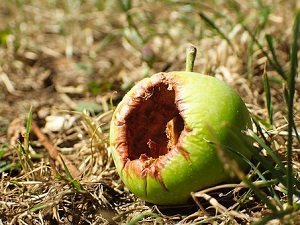 When fruit is mistreated—by overwatering or by planting in bad climate—it produces bitterness, which is stored in the root.
When fruit is mistreated—by overwatering or by planting in bad climate—it produces bitterness, which is stored in the root.
Researchers say the chemicals from this kind of food could potentially kill if eaten. Once a plant creates a bitter product, the bitterness must be cut from the root, because it will continue to produce more bitter food. Bitter fruit is sharp and sour. Sometimes it’s even smelly.
We can become like the fruit: angry, unsweet, sour, resentful. Paul says to get rid of every form of meanness, including bitterness. He says to be caring and understanding to everyone all the time. This includes the one who let you down, cheated on you, abused you, and lied about you. And this requires forgiveness.
As with fruit, when we are wronged, bitterness forms in our root—our heart. This may be because of bad experiences. Perhaps we were cheated on, fired, or sued. As with food, bitterness spreads to other areas of our lives. It effects our minds, our will, our emotions, and our health.
Medical professionals suggest bitterness can lead to diseases like cancer. Bitterness is contagious and will affect other fruit in our lives—like joy, peace, and happiness. Our hurting hurts the ones we love. We must quickly uproot that which produces bitterness.
In spite of our good intentions, we still let others we love down. We all have fallen short of the measure. Jesus alone is perfect. When we place others in His seat, we open the door for disappointment.
Let your life produce kindness, compassion, and forgiveness.
(Photo courtesy of pixabay.)
(For more devotions, visit Christian Devotions.)



Jennifer Gray is a Thought Catalog published author of encouraging and thought-provoking material which she transcribes in an attempt to challenge the reader to seek truth, then change. She is the wife of a correction’s officer and the mother of four peculiar yet curious children. She is an investigative researcher, a philanthropist, a member of her local church’s street ministry, a drawing artist, a motivational speaker, and a singer. She finds that being among different people, changing environments, challenging cultures, and away from comfort zones provides for the healthiest research.